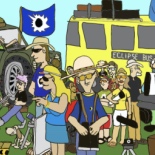
|
www.eclipse-chasers.com Safe Solar Eclipse Observing Author: Bill Kramer |
Eclipse Chaser
(noun) - Anyone that wants to see a total solar eclipse.  Search Eclipse Chasers Site
Search Eclipse Chasers Site |
Safe Solar Eclipse Observing
The Basic Rule: Never look directly at the bright sun.
It is never a good idea to look directly at the bright surface of the sun since it can be damaging to your eyes. Vision is a precious thing and you should take care to preserve it. A glance at the bright surface of the sun, especially through a telescope or binoculars can ruin your vision for life. Therefore, take extreme caution when viewing the sun and always consult with an expert.
The ONLY exceptions to the Basic Rule
There are, however; some specific circumstances that would allow you to look at the sun directly - but you must know exactly what you are doing. The first two involve technology.
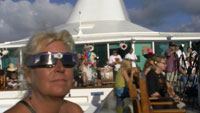 The first and most common circumstance is when solar filters are used. A solar filter works by blocking the sun's brightness and harmful radiation. These filters should be checked carefully before use and should also come from a reputable supplier. When used, the bright light is reduced to a tiny fraction of normal allowing you to look at the sun. The Sun is just about the only thing you can see with a good solar filter. Using a solar filter you can see large sunspots, transits, and solar eclipses. It is strongly advised that you do not use a solar filter unless under the direct supervision of an expert in solar observing. The European Standard EN 1836:2005+A1:2007 is recommended for personal eye protection. Note that solar viewers should not be used in conjunction with a telescope or binoculars. Telescopes and binoculars should have solar filters created specifically for the optics involved.
The first and most common circumstance is when solar filters are used. A solar filter works by blocking the sun's brightness and harmful radiation. These filters should be checked carefully before use and should also come from a reputable supplier. When used, the bright light is reduced to a tiny fraction of normal allowing you to look at the sun. The Sun is just about the only thing you can see with a good solar filter. Using a solar filter you can see large sunspots, transits, and solar eclipses. It is strongly advised that you do not use a solar filter unless under the direct supervision of an expert in solar observing. The European Standard EN 1836:2005+A1:2007 is recommended for personal eye protection. Note that solar viewers should not be used in conjunction with a telescope or binoculars. Telescopes and binoculars should have solar filters created specifically for the optics involved.
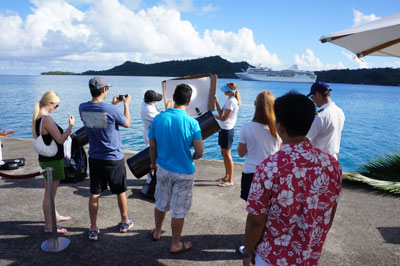
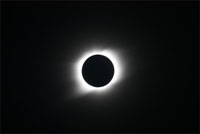
A very special circumstance when you can look at the Sun safely is during a total solar eclipse. For a few minutes the moon gets in the way of the brightest part of the sun making it safe to see other parts of the sun such as the corona, prominences, and chromosphere. You can (and should) look directly at the sun without a filter, but only look at the sun during totality. Do not look directly at the sun during the partial phases leading up to the total phase. If you are not sure when it is safe to look at the eclipsed sun, ask someone who has been there before to tell you when it is safe. And then look away when instructed to do so.
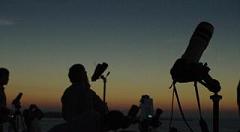 When viewing a total solar eclipse you will know it is safe to look at the Sun directly when the sky is dark. It will be about as dark as if a bright full moon is in the sky. And that is about how bright the solar eclipse will appear, like a full moon. Solar viewing glasses should be removed to enjoy totality and then used once again when totality ends. Totality only lasts a few minutes (seven at the most), and it is worth seeing!
When viewing a total solar eclipse you will know it is safe to look at the Sun directly when the sky is dark. It will be about as dark as if a bright full moon is in the sky. And that is about how bright the solar eclipse will appear, like a full moon. Solar viewing glasses should be removed to enjoy totality and then used once again when totality ends. Totality only lasts a few minutes (seven at the most), and it is worth seeing!
Select a Safe Location
Safe Solar Eclipse Observing also involves more than just not looking at the sun. Selecting the right location and locale can be equally important. For example, it is not advised to set up very near to a highway as a driver may loose control during totality attempting to view the eclipse while underway. In the European eclipse of 1999, at least one traffic fatality was reported that was directly attributed to the eclipse. The driver was looking up and not where they were going, and thus ran into a row of parked cars along the side of the highway.
The location where you set up will either greatly enhance or greatly deter from your enjoyment of the eclipse event. If you want to enjoy the eclipse then do not set up next to "party people". Some people go to the eclipse strictly for the party atmosphere and this can diminish the enjoyment of someone who is solely interested in observing the phenomena. On the other hand, if you are looking for a party during the eclipse, don't set up next to some "stick in the mud" astronomer intent on ruining your party! Look for others that want to enjoy the eclipse the way you do. You will enjoy it more as your share your common experience after the eclipse is over.
Recommended
People often ask the question Where is the best place to watch the eclipse? as if there is a singular location that is truly better than all others. There is no simple answer to this question. Of greatest importance is to find a place where the eclipse is visible, has good weather, and does not present any personal safety issues. To find that place, here are some suggestions. Your preference will most likely be different than others which is why there is a selection of options.
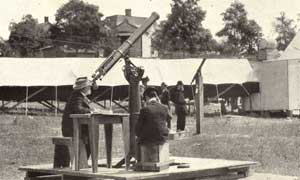
Contact a local astronomy club: Local astronomy societies and clubs are the best resource for finding a safe solar viewing location. When a solar eclipse or transit is taking place, these are the people that should know about it and how to observe it. Most will be hosting a local event where telescopes will be set up and experts can be consulted. Even if a specific event is not planned, they will know places where you can observe the Sun. Click here to begin a search for a local club.
Contact a local science museum: Observatories, planetariums, and science museums will have advice on where to observe an eclipse in the area. Some will have telescopes and viewers for sale that can be used. Nearby large cities with museums and universities with astronomy departments are good places to start asking questions.
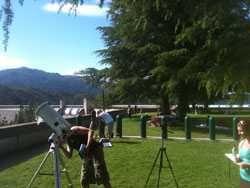 State and National Parks: Park rangers and police will often arrange public viewing areas or at least keep an eye on places where people congregate. In some special circumstances one (or more) of the park staff will have an interest in astronomy and will put together a more organized viewing area. Contact the ranger station or local police to find out if a public viewing area is designated. There may be restrictions on setting up solar viewing telescopes in some public areas. It is best to check ahead of time if you plan to bring anything of that type along to public venues.
State and National Parks: Park rangers and police will often arrange public viewing areas or at least keep an eye on places where people congregate. In some special circumstances one (or more) of the park staff will have an interest in astronomy and will put together a more organized viewing area. Contact the ranger station or local police to find out if a public viewing area is designated. There may be restrictions on setting up solar viewing telescopes in some public areas. It is best to check ahead of time if you plan to bring anything of that type along to public venues.
At the hotel or resort where you are staying: The biggest advantage of doing this is that you will not have to carry your equipment far or endure a long bus or car ride to the observing site. In addition, if you plan to celebrate the eclipse with a toast or party, the hotel will normally be quite accommodating.
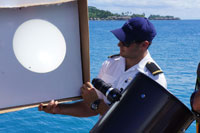 On board a ship: Ship travel (cruising) offers a great way to view the eclipse and enjoy the hospitality of a resort like community. Another advantage with ships is that one does not have to worry about the weather as much since the crew has access to modern navigational tools and meteorological data. Since most eclipses occur over water (3/4 of the Earth is water) at some point or another the ship can maneuver into clear, calm waters and sky conditions that allow you observe the eclipse.
On board a ship: Ship travel (cruising) offers a great way to view the eclipse and enjoy the hospitality of a resort like community. Another advantage with ships is that one does not have to worry about the weather as much since the crew has access to modern navigational tools and meteorological data. Since most eclipses occur over water (3/4 of the Earth is water) at some point or another the ship can maneuver into clear, calm waters and sky conditions that allow you observe the eclipse.
With an organized tour group: Eclipse travel groups are becoming very common these days and you can hitch along with an expert who has scouted out the area and considered many other comfort aspects of the eclipse observing. If you venture out on your own, you may not find a friendly location to set up your telescope let alone additional amenities such as food, something to drink, and a restroom to relieve yourself! The eclipse event last several hours and your enjoyment will be greatly enriched by sharing it with others who are there for the same reason. And let's face it, there is safety in numbers for these sorts of things. (And organized groups will hire security if it is really needed.)

Not recommended
Along the highway: As mentioned before, it can be quite hazardous to simply pull over to the side of the road and set up a telescope. About the only way that will work is if you pull over at a rest area. In addition, that location might have some facilities even though they may be limited.
Near a neighborhood hangout: The locals will undoubtedly come out to see what is going on and if you happen to be setting up, they will come over to see what you are doing. If your intent is to share your knowledge with the locals, this can be wonderful but if you have traveled a long distance, are by yourself, do not speak the local language, and want to observe the eclipse in peace; this may not be a good place.
In a crowd: One again, if your intent is to teach about the sun and the eclipse then setting up in a crowded location can be fun. But if you are after pictures of the eclipse you may not want to be in a place where someone could trip over your tripod or block your view of the sun. In some cases, a crowd cannot be avoided such as on a cruise ship. Under those circumstances it is recommended that you set up in a group of friends or acquaintances that will not disturb your process.
On an animal path: Another place not to set up is on a path normally traveled by animals going in and out at the end or start of a day. That is, unless your plan is to watch the animals and not the eclipse to see what effect the eclipse has on them. There is a story of an eclipse watcher who set up in a chicken coup to get out of the wind. During totality the eclipse chaser did not see much as the chickens all came home to roost for the evening as totality set in. I've also heard about an observer that set up near a lake full of wild birds that took flight during the eclipse blocking the view of the eclipse. Whether these stories are true or not doesn't really matter, the lesson they teach is simple; avoid animal paths and habitats.
Near a war zone: This should be pretty obvious. A war zone can shift directions at any time and stray munitions could get dangerously near. If the country you are visiting is experiencing revolution or terrorist activities to a high degree, it will be a good idea to either avoid that area or to hire your own security to ensure your safety.
There are other considerations when selecting a viewing location. Because most eclipse chasers have brought cameras, are tourists in the area of the eclipse, and many have binoculars or telescopes, they may be prime targets for thieves. Although you cannot really say that anyplace is 100% safe all the time, you should be prudent in selecting a location that will not make you too much of a target.
Links to other Web sites
AAS - Eyewear and Handheld viewers
AAS - Optics Filters
AAS - Projection
IAU - Eclipse information portal
NASA - Eye Safety during solar eclipses by F. Espenak
NASA - Eye Safety during solar eclipses by B. Ralph Chou, MSc, OD
SpaceWeather - Do-it-yourself Sunspot Watching
Sky and Telescope - Safe Solar Observing
AWB - Video - Safe Solar Viewing
MrEclipse - Eclipse Filters
John Mcconnell FRAS - Solar Observing Tips
BSI - European Standard for personal eye equipment (EN 1836:2005+A1:2007) (courtesy of KD Optical
Links to Safe Solar Viewing Supplies
Rainbow Symphony
Eclipse Shades
Thousand Oaks Optical
Sky and Telescope links page
